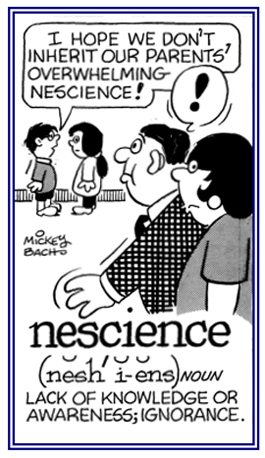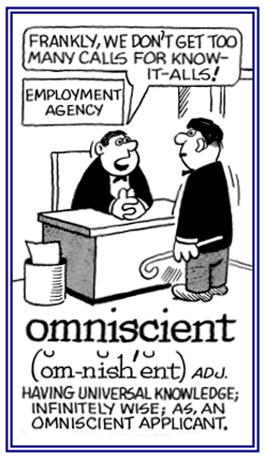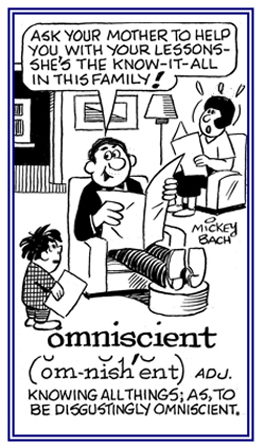sci-, -science, -scientific, -scientifically, -scient, -sciently
(Latin: to know, to learn; to have knowledge)
No knowledge of a science can be properly acquired until the terminology of that science is mastered, and this terminology is in the main of Greek and Latin origin.
Nanoscience consists of technology that utilizes the ability to build devices which are extremely small.
In nanoscience, nanometers are used to measure the smallest things; usually, those that are the size of an atom or molecule, and are used when working with miniature computing devices; such as, integrated circuits (IC) and transistors in a processor.
Some microchips in nanoscience have transistors which are 100 nanometers wide and can accommodate more than one billion transistors within a single microchip.


Go to this Word A Day Revisited Index
so you can see more of Mickey Bach's cartoons.
2. A reference to asserting that some people are incapable of understanding what is going on.
2. The scientific study of the molecular and cellular levels of the nervous system, or systems within the brain; such as, vision and hearing, and of behavior produced by the brain.
2. Kind, or showing courtesy, friendliness, or consideration: It was very nice of him to return my purse and the money that was in it, too.
3. Respectable, or of an acceptable social or moral standard: We have made some nice contacts in our new neighborhood.
4. Pleasing to look at: Shirley was wearing a very nice outfit.
5. Etymology: Nice is one of the more celebrated examples in English about a word that changed its meaning out of any recognition over the centuries.
In this case, from "stupid" to "pleasant".
Its ultimate source was Latin nesius, "ignorant," a compound adjective which was formed from the negative element ne- and the base of the verb scire "to know" which is the source of English science.
This passed into English via Old French nice with a minimal change of meaning, but from then on a slow but sure semantic transformation took place, from "foolish" via "shy" then "fastidious" and "refined" to "minutely accurate or discriminating" as in a "nice distinction" and on then to "pleasant, agreeable".
From the Dictionary of WORD ORIGINS, By John Ayto, page 364, Arcade Publishing, New York, 1990.
2. A reference to doing something accurately, exactly, and with the exact order or proportion: The building was nicely adjusted and its shape was nicely proportioned.
2. Descriptive of an individual who has extensive perceptions or as much erudition as possible in a certain field or area: Omniscient people are supposedly skilled in everything and take pride in their abilities and infinite mental gifts that are usually suspected of being figments of their imaginations.
3. Etymology: from Latin omnis, “all” + scientia, "knowledge".


Go to this Word A Day Revisited Index
so you can see more of Mickey Bach's cartoons.
2. A reference to someone having total knowledge.
3. Etymology: from Latin omnis, "all" + sciens, "knowing".
Motto of Texas College, Tyler, Texas, USA.
Motto of Johns Hopkins School of Hygiene and Public Health, Baltimore, Maryland, USA.
The police gave the bank a prescient warning that they had heard that a robbery was being planned by criminals.
2. Etymology: from Latin praescient-, "knowing beforehand", from the verb praescire, from prae, "before" + scire "to know".2. A reference to human anticipation of the course of events.
Related articles about science: "Science Race"; STEM, Part 1; STEM, Part 2; Scientific Specialties.
Inter-related cross references, directly or indirectly, involving word units meaning "know, knowledge; learn, learning": cogni-; discip-; gno-; histor-; intellect-; learn, know; math-; sap-; sopho-.


